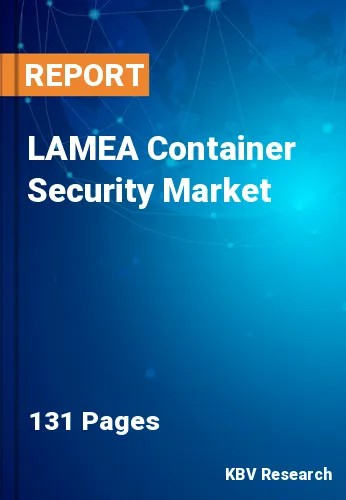The Latin America, Middle East and Africa Container Security Market would witness market growth of 28.4% CAGR during the forecast period (2021-2027).
Container security refers to the practise of safeguarding containers from viruses, data leaks, and other threats during the course of their lives. Docker security protects the entire environment, along with the software supply chain or CI/CD pipeline, container runtime, infrastructure, and life cycle management apps that use containers. Furthermore, rising concerns about container cyber security in the healthcare, IT & telecommunications, and government sectors are expected to drive demand for container security.
While containerized apps are not yet the de facto standard for application deployment, their efficiency and agility are gaining traction in the industry. There are measures businesses may take, as per the National Institute of Standards and Technology (NIST), to mitigate the security concerns associated with containers without losing their efficiency. To scan and monitor pictures at scale, NIST advises that IT operations teams connect an automated secure system with existing container orchestrator. Organizations that employ container-native solutions to define and implement policies to avoid vulnerable images from being installed will be in the strongest position to overcome security hurdles to container adoption in the future.
Most of the Middle Eastern companies are trying to develop a contemporary data protection plan should keep three key pillars in mind: cloud, security, and containers. Businesses must have a thorough knowledge of what cloud computing can do for them and why it is so vital. Second, before to the pandemic, organizations are consolidating office with all of our personnel in one location. The organization's borders have become invisible as a result of decentralisation. Data is dispersed, necessitating the implementation of a comprehensive security policy to protect all entry points.
Cyberattacks can have a negative impact on day-to-day operations, revenue, and other issues, but they can have a negative influence on brand reputation and workforce. Businesses will continue to invest in and protect themselves against the ever-increasing number of cyberattacks, particularly ransomware. Despite the fact that businesses invest heavily in security technology, there remains a significant gap in terms of designing and implementing a security strategy. This is mostly due to the IT environment's complexity.
The Brazil market dominated the LAMEA Container Security Market by Country 2020, and would continue to be a dominant market till 2027; thereby, achieving a market value of $73.8 Million by 2027. The Argentina market is poised to grow at a CAGR of 29.1% during (2021 - 2027). Additionally, The UAE market would witness a CAGR of 28.1% during (2021 - 2027).
Based on Component, the market is segmented into Products and Services. Based on Services Type, the market is segmented into Professional Services and Managed Services. Based on Organization Size, the market is segmented into Large Enterprises and Small & Medium Enterprises (SMEs). Based on Vertical, the market is segmented into BFSI, Retail, IT & Telecom, Manufacturing, Healthcare, Government and Others. Based on countries, the market is segmented into Brazil, Argentina, UAE, Saudi Arabia, South Africa, Nigeria, and Rest of LAMEA.
Free Valuable Insights: The Global Container Security Market is Predict to reach $3.9 Billion by 2027, at a CAGR of 23.5%
The market research report covers the analysis of key stake holders of the market. Key companies profiled in the report include Cisco Systems, Inc., VMware, Inc., Palo Alto Networks, Inc., IBM Corporation, Microsoft Corporation, Juniper Networks, Inc., Google LLC, Amazon.com, Inc., Rapid7, Inc., and Crowdstrike Holdings, Inc.
By Component
By Organization Size
By Vertical
By Country
Our team of dedicated experts can provide you with attractive expansion opportunities for your business.

